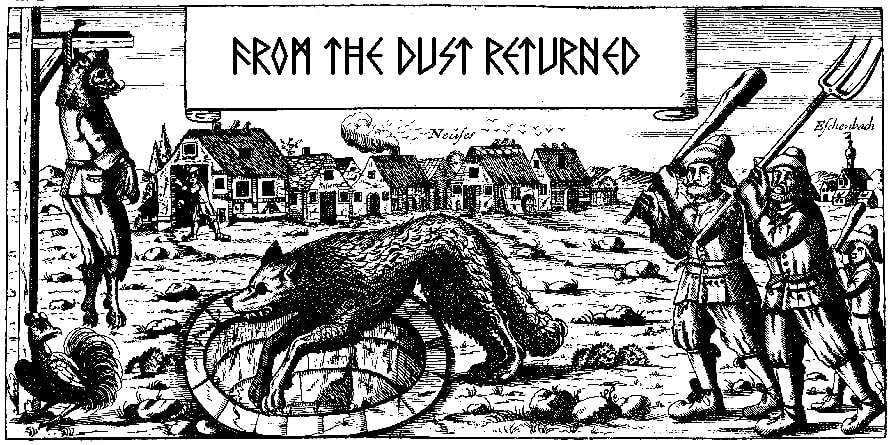 You could try reciting this album's title three times in rapid succession, but in the event that you don't actually hate yourselves, perhaps it is best to marvel at the construction of such words and turn your attention to what is far more important, the scathing and morbid dementia of Prosanctus Inferi's first full-length studio LP. This is the work of one J. Kohn, no newcomer to the scene of US debauchery, having performed in both Father Befouled and Black Funeral, two bands of not so merry men that you'd not want to encounter outside the blood bank on some random night alone. Here Kohn performs both the guitars and vocals in a style perfectly aligned to the Hell's Headbangers roster it is seeing release through, a primal and sadistic mesh of black and death metal which seems to take a page from the classics by Morbid Angel (Altars of Madness era), Singapore maniacs Impiety and crude 90s death metal icons like Incantation and Demilich.
You could try reciting this album's title three times in rapid succession, but in the event that you don't actually hate yourselves, perhaps it is best to marvel at the construction of such words and turn your attention to what is far more important, the scathing and morbid dementia of Prosanctus Inferi's first full-length studio LP. This is the work of one J. Kohn, no newcomer to the scene of US debauchery, having performed in both Father Befouled and Black Funeral, two bands of not so merry men that you'd not want to encounter outside the blood bank on some random night alone. Here Kohn performs both the guitars and vocals in a style perfectly aligned to the Hell's Headbangers roster it is seeing release through, a primal and sadistic mesh of black and death metal which seems to take a page from the classics by Morbid Angel (Altars of Madness era), Singapore maniacs Impiety and crude 90s death metal icons like Incantation and Demilich.This influence is disgustingly wrought into a slew of incendiary compositions which feature blasted drums, shifting though coherent barbarian rhythms, and titillating, mysterious leads that often poke their way through like a maggot on a cigarette break from its latest carcass. Its all over in a flash, with a dozen tracks in 24 minutes, most hovering right at the 2-minute mark and cycling through their twists and turns before you can even catch up to what you're hearing. With titles like "Burning Vestal Apocrypha", "Flayed Ecclesian Sophistry", "Fumugating Portentious Sacriligium" and "Pontifical Undulations of Blasphemic Gesticulation", you can never be sure if Prosanctus Inferi is playing us all for laughs or damned, small-minded fools. One can be sure that there is a great deal of sacrilege involved here, from the titles alone, but Kohn has a tendency to take such ideals and thrust them far over your head, at the same level of vile, obscure discourse as the choice in Francis Bacon cover art.
Pandemonic Ululations of Vesperic Palpitation can become quite repetitious when taken in full, so this is one of those rare albums that I'd actually advise to consume in smaller doses. Perhaps 4-6 minutes of time, a 1-2-3 combo platter of blasphemous splatter that slowly edges your position in pearly gates' queue towards the rear, where it is being molested by Prosanctus Inferi's ugly, lashing members and tentacles as the album sucks and grinds. Some of the better numbers are tucked deep into the track-list, like the "Depraved Machinations" which resonate like a cockfight between early Morbid Angel and Repulsion, or "Sacreligious Desecration in Excelsis", a serpentine coil of taut hostility and hellish momentum dripping with the still fresh blood of early 90s wounds.
I would not recommend the album to anyone seeking something 'catchy', because clearly that is not the intent here so much as it is to simply kill the listener and gorge on his heart, while the dead eyes retain the shock and revulsion, never knowing quite what happened to it. The vocals are suitably loathsome, but often lost among the thrust of the myriad similar rhythms, which only cease their blasting toil for the occasional atmospheric breakdown like the toiling bell deep in "Echoes of Pestilential Synod", or the great dark ambient outro "....". The titles and art might be a lot more intelligent than the battered and bruised cruise mode that this album's riffing sinks into, but something among the vapid stupidity reeks of a violent sincerity calls to me like a cruel, mocking laughter from the grave, and I see no reason that Pandemonic Ululations could not at least serve to befuddle and frighten away members of the local clergy as they lurch desperately door to door to save our fleeing souls.
I truly hated this album. We should all hate it. In all the right ways. Translation: working as intended.
Verdict: Win [7/10]
http://www.myspace.com/prosanctusinferi

















